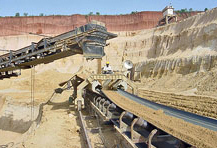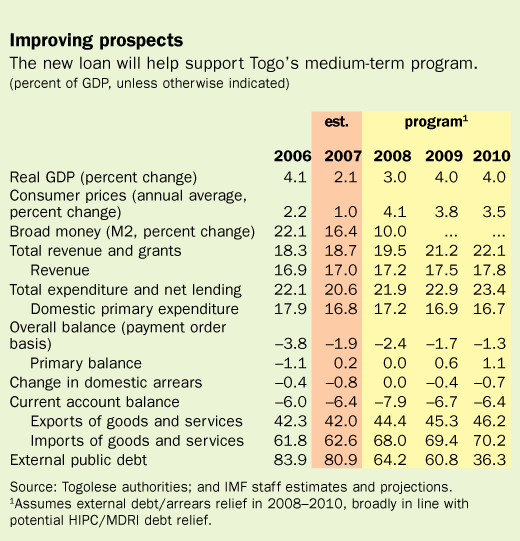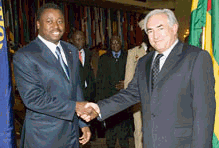
Typical street scene in Santa Ana, El Salvador. (Photo: iStock)
IMF Survey: In Signal to Donors, IMF to Lend Togo $108 million
April 21, 2008
- IMF approves $108 million for Togo under Poverty Reduction and Growth Facility
- Will help Togo move toward comprehensive debt relief
- Program envisages boost in spending on infrastructure, health, and education
The IMF's Executive Board approved on April 21 a low-interest loan for Togo of about $108 million to help rebuild its economy, becoming the first major international financial institution to resume lending to the west African state after most donors withdrew financial support more than a decade ago.

Phosphate mine in Togo: reforms of state-owned entities in phosphate sector aim to sustain medium-term economic growth. (photo: Emile Koulon/AFP)
New PRGF loan
Parliamentary elections last year paved the way for the resumption in financial support by major donors to the country of 6 million people which lies sandwiched between Ghana and Benin.
"Togo has made significant progress since 2006 in advancing economic and political reforms," said Takatoshi Kato, Deputy Managing Director and Acting Chair, following the Board discussion.
Improved fiscal position
"With the support of a successful IMF Staff-Monitored Program, the authorities have implemented important fiscal governance reforms that have boosted tax revenues and strengthened expenditure control. This has resulted in a much-improved fiscal position and reversed the accumulation of domestic arrears. Structural reforms in the banking, cotton, phosphate, and energy sectors have begun," he added.
The Board approved a three-year arrangement under the IMF's Poverty Reduction and Growth Facility (PRGF) amounting to SDR 66.06 million (about $108 million) to support the government's economic program for 2008-10. An initial disbursement of SDR 13.26 million (about $22 million) will become available immediately.
"The authorities' medium-term economic program, supported by the new PRGF arrangement, will help sustain the reform momentum. The program, anchored in Togo's Interim Poverty Reduction Strategy Paper, aims to revive economic growth and reduce poverty within a stable macroeconomic environment, Kato added.

Bringing public debt down
A central objective is to bring Togo's excessive public debt to a sustainable level through gradual fiscal adjustment and debt relief. The PRGF-supported program will help Togo move toward comprehensive debt relief under two IMF-backed initiatives.
"The program also envisages a significant boost in spending on infrastructure, health, and education to promote economic growth and improve basic living conditions. Prudent macroeconomic policies and close coordination with regional partners and donors will be critical for addressing external shocks such as the recent surge in food and oil prices," Kato stated.

Togo's President Faure Gnassingbé (l) meets in November 2007 with IMF Managing Director Dominique Strauss-Kahn, who welcomed country's political reform process. (IMF photo)
Reviving economic growth
The IMF says that reforms of state-owned enterprises in the cotton and phosphate sectors, measures to address energy supply problems, investment in transport infrastructure, and improvement of the business environment will help to revive and sustain economic growth over the medium term.
"A coordinated effort to reengage with donors and creditors will be vital to program success. A sharp increase in concessional financing will be necessary for the growth-oriented investment and social expenditures envisaged in the program. Stepped-up technical assistance will be critical for rebuilding institutional capacity, which has been eroded by the long socio-political crisis and interruption in donor support," stressed Kato.
The new loan to Togo follows the recent IMF announcement backing Liberia's economic recovery, after a ruinous 14-year period of civil war, with debt relief and new financing.
Comments on this article should be sent to imfsurvey@imf.org







